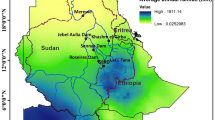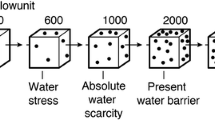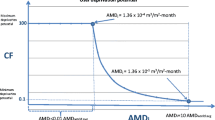Abstract
We consider the problem of sharing water among agents located along a river, who have quasi-linear preferences over water and money. The benefit of consuming an amount of water is given by a continuous, concave benefit function. In this setting, a solution efficiently distributes water over the agents and wastes no money. Since we deal with concave benefit functions, it is not always possible to follow the usual approach and define a cooperative river game. Instead, we directly introduce axioms for solutions on the water allocation problem. Besides three basic axioms, we introduce two independence axioms to characterize the downstream incremental solution, introduced by Ambec and Sprumont (J Econ Theory 107:453–462, 2002), and a new solution, called the UTI incremental solution. Both solutions can be implemented by allocating the water optimally among the agents and monetary transfers between the agents. We also consider the particular case in which every agent has a satiation point, constant marginal benefit equal to one up to its satiation point and marginal benefit of zero thereafter. This boils down to a water claim problem, where each agent only has a nonnegative claim on water, but no benefit function is specified. In this case, both solutions can be implemented without monetary transfers.
Similar content being viewed by others
Notes
In 1895, Mexico complained that the USA extracted too much water from the Rio Grande, causing shortages in Mexico. Asked for his opinion, Judson Harmon, the Attorney General of the US Department of Justice, responded that ‘the US is under no obligation to Mexico to restrain its use of the Rio Grande because its absolute sovereignty within its own territory entitles it to dispose of the water within that territory in any way it wishes’ (McCaffrey 1996, p. 563).
Ambec and Sprumont (2002) require this to hold for any coalition of consecutive agents \(\{i, i+1, \ldots , j\},\ i \le j\), see the comments in the concluding remarks. Within the framework of cooperative games, this is the well-known notion of core stability for a corresponding game based on the ATS principle. For a single agent coalition, this stability notion reduces to individual rationality, saying that the payoff to agent \(i\) should be at least equal to \(b_i(e_i)\). The application of this notion of individual rationality as a participation constraint in international agreements on water use, is restricted when one also has to take account of other water principles, such as the UTI principle.
Notice that under Assumption 2.1 this benefit of consuming at most its own water inflow is at least equal to the benefit of consuming a zero amount of water.
Note that, under increasing benefit functions, we can write this inequality as \(f_i(N,e,b) \le b_i(\sum _{i \in N} e_i)\) for all \(i \in N\).
In the next section we will consider the ‘opposite’ independence of upstream benefits.
Notice that at the counterpart this also implies that an upstream agent cannot be awarded for higher positive externalities that it might generate for downstream agents, when the use of water by the latter agents becomes more beneficial.
The proof can be easily adapted by replacing the benefit functions \((b^i)_j(x)=0\) for all \(x \in {\mathbb {R}}_+\) and \(j \in \{i+1, \ldots , n\}\), by \((b^i)_j(x)=-x^2\) for all \(x \in {\mathbb {R}}_+\) and \(j \in \{i+1, \ldots , n\}\). Ambec and Ehlers (2008) and van den Brink et al. (2012) additionally assume the benefit functions having derivative going to infinity at zero, so \(b_i(0)\) cannot be equal to zero as in the benefit functions used in the proof of Theorem 4.2. Also, without further axioms, Theorem 4.2 does not hold when the benefit functions are restricted to the smaller class of functions that satisfy the assumptions of Ambec and Sprumont (2002).
For the auction games of Graham et al. (1990), it is shown in van den Brink (2004) that, together with efficiency and symmetry, independence of higher valuations characterizes the Shapley value, while independence of lower valuations characterizes the equal division solution. In bankruptcy or rationing problems, independence on higher claims is used to characterize the constrained equal awards rule, while independence on lower claims is used to characterize the constrained equal losses rule, see, e.g. Moulin (2003).
In bankruptcy problems, the lower bound property and weak aspiration level property are often taken together as part of the definition of a bankruptcy solution.
References
Ambec S, Ehlers L (2008) Sharing a river among satiable agents. Games Econ Behav 64:35–50
Ambec S, Sprumont Y (2002) Sharing a river. J Econ Theory 107:453–462
Ansink E, Weikard H-P (2012) Sequential sharing rules for river sharing problems. Soc Choice Welf 38:187–210
van den Brink R (2004) Null or zero players: the difference between the shapley value and the egalitarian solution, Tinbergen Discussion Paper TI 2004–127/1. VU University, Tinbergen Institute, Amsterdam
van den Brink R, van der Laan G, Vasil’ev VA (2007) Component efficient solutions in line-graph games with applications. Econ Theory 33:349–364
van den Brink R, van der Laan G, Moes N (2012) Fair agreements for sharing international rivers with multiple springs and externalities. J Environ Econ Manag 63:388–403
Dinar A, Kemper K, Blomquist W, Diez M, Sine G, Fru W (2005) Decentralization of river basin management: a global analysis, World Bank Policy Working Paper 3637. World Bank, Washington
Dinar A, Ratner A, Yaron D (1992) Evaluating cooperative game theory in water resources. Theory Decis 32:1–20
Dinar A, Rosegrant M.W, Meinzen-Dick R (1997) Water allocation mechanisms: principles and examples, Policy Research Working Paper 1779, World Bank, Washington DC
Fleurbaey M (2008) Fairness, responsibility, and welfare. Oxford University Press, Oxford
Graham DA, Marshall C, Richard J-F (1990) Differential payments within a bidder coalition and the Shapley value. Am Econ Rev 80:493–510
International law association (1966) The Helsinki rules, report of the fifty-second conference, pp 484–533
Khmelnitskaya AB (2010) Values for rooted-tree and sink-tree digraph games and sharing a river. Theory Decis 69:657–669
McCaffrey SC (1996) The Harmon doctrine one hundred years later: buried, not praised. Nat Resour J 36:549–590
Moulin HV (2003) Fair division and collective welfare. MIT Press, Cambridge, MA
Parrachino I, Dinar A, Patrone F (2006) Cooperative game theory and its application to natural, environmental and water resource issues: 3. Application to water resources, World Bank Policy Research Working Paper 4074, World Bank, Washington DC
United Nations (1997) Convention on the law of the non-navigational uses of international watercourses, New York
Wang Y (2011) Trading water along a river. Math Soc Sci 61:124–130
Author information
Authors and Affiliations
Corresponding author
Additional information
This research is financially supported by Netherlands Organization for Scientific Research NWO grant 400-07-159. We thank two anonymous referees and the associate editor for their valuable comments.
Rights and permissions
About this article
Cite this article
van den Brink, R., Estévez-Fernández, A., van der Laan, G. et al. Independence of downstream and upstream benefits in river water allocation problems. Soc Choice Welf 43, 173–194 (2014). https://doi.org/10.1007/s00355-013-0771-x
Received:
Accepted:
Published:
Issue Date:
DOI: https://doi.org/10.1007/s00355-013-0771-x




